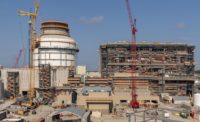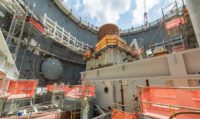As continuing construction delays cause financing and related costs to mount, time is starting to put "significant" strain upon the Plant Vogtle nuclear expansion project's economics, according to recent testimony presented to the Georgia Public Service Commission by Georgia Power, state monitors and others. As a result, considerable discussion at the recent June hearings focused on whether completing the nuclear project still makes economic sense.

In its latest report to the PSC, Georgia Power repeated the contractor's latest estimate for completion, which extends the previous schedule by 18 months to the revised in-service dates of June 2019 and June 2020, for Units 3 and 4, respectively. Additionally, Georgia Power executives stressed the contractor—a consortium of CB&I and Westinghouse Electric Co.—was at fault but remained publicly optimistic that future schedule slippage could be avoided.
"The contractor must improve its performance in order to mitigate risks to the current forecast for substantial completion," stated Georgia Power executives Alison Chiock, David Clem and David McKinney in joint testimony to the PSC.
State monitors Steven Roetger and William Jacobs—working on behalf of the PSC—elaborated on that concept in their joint testimony.
"We believe that little to no margin, or float, is embedded in the January 2015 [schedule]," they stated. "Consequently, [we] believe that there exists significant schedule delay risk." For instance, they noted, if Unit 4's schedule slips by more than six months—resulting in an in- service date past Jan. 1, 2021—Georgia Power could lose an estimated $522 million in production tax credits, possibly resulting in higher costs to ratepayers. Georgia Power owns about 46% of the project—which has an overall capital cost of $11 billion, plus financing—with other utilities sharing remaining costs.
In fact, Roetger and Jacobs added that a schedule updated in March adds three months to the new units' in-service dates.
Roetger and Jacobs further estimated the project's construction completion percentage at less than 25%, as of April.
Philip Hayet, another PSC analyst, said these ongoing delays are adding "significant" stress to the project's underlying economic justification for Georgia Power. The bottom line, he says, is that the utility's share of the project's cost rose by 23%, to about $7.5 billion, including financing, since its last annual report. At the same time, the utility's estimated benefit for completing the units—versus stopping and building a natural gas plant instead—dropped 39%, from $5 billion to $3 billion.
Additionally, Glenn Carroll, with anti-nuclear group Nuclear Watch South, testified that "it would be cheaper to cancel construction given that Plant Vogtle 3 and 4 are not needed." Carroll cited Georgia Power data showing that the utility used just 58% of its system capacity in 2014.






